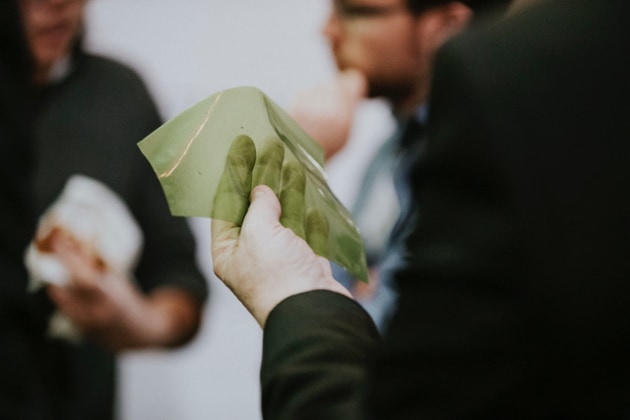A trio of University of Sydney graduate students has found a way to produce biodegradable packaging from crustacean skeletons.
Carapac, founded by Michelle Demers, Jared Wood and Kimberly Bolton, creates plastic packaging from materials found in crustacean waste from the food processing industry.
“Food processing plants in Asia and Australia cumulatively produce 8.1 million tons of crustacean waste per year,” they said. “Carapac has created a packaging material built from the chitin and a cellulose contained in crustacean skeletons as a truly biodegradable alternative to plastic food packaging.”

According to the Carapac founders, though 300 million tonnes of plastic is produced each year, biodegradable products are less sustainable than they seem, with many taking around five years to break down and releasing the greenhouse gas methane in the process. Demers, Wood and Bolton say that, by contrast, there is no need to recycle or industrially compost their product.
“Simply throw used Carapac packaging into your garden, plant pots or home compost and the material will naturally break down in the soil in just three to weeks. As an added bonus the product boosts soil quality.
“Once Carapac material is in the ground it provides the soil with many nutrients and acts as a slow release nitrogen fertiliser, making it the world’s only Waste Negative packaging solution,” they said.
Carapac products currently cost three times the price of those made from traditional plastics, though the company’s founders note that this is still less than biodegradable competitors, which come in at five times the price of non-biodegradable options.
“The start-up is looking to drastically reduce those prices through new production methods, so that ethical consumerism is a realistic option for everyone and not just for the wealthy.
“This cost reduction and the ability to develop more single-use plastic replacements will only be possible with support from corporate partners,” they said.
According to Demers, Wood and Bolton, investing in environmentally conscious startups like theirs can deliver major profits to corporations.
“More and more consumers are rejecting single-use plastic products and seeking out truly biodegradable alternatives, as seen in the massively successful Last Plastic Straw campaign.
“Carapac’s goal is to provide a solution that doesn’t just replace single-use plastics, but makes the world a better place by eliminating waste while simultaneously improving soil quality,” they said.





